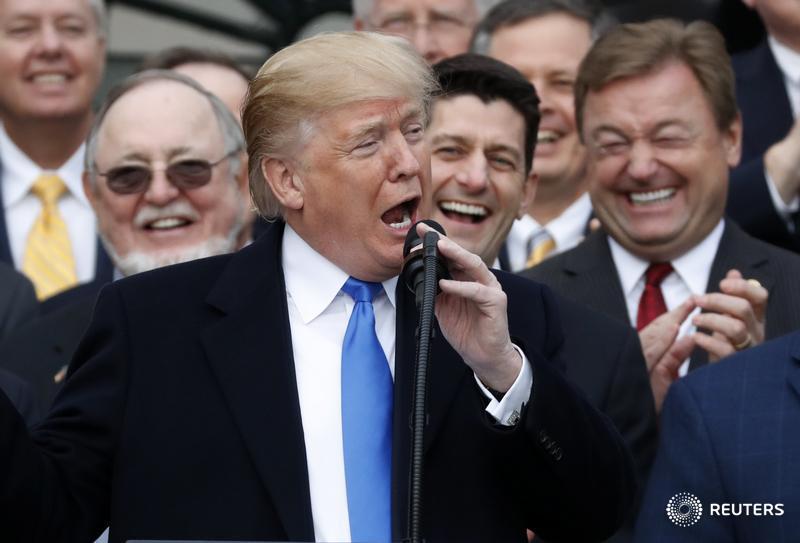Critics say cuts will exacerbate inequality and that it favours major corporations and the wealthy

LOS ANGELES (Variety.com) - AT&T and Comcast announced that they would give their workforces $1,000 in bonuses following the passage of tax reform that includes a massive cut in the corporate tax rate.
The move comes amid criticism from Democrats and even former New York Mayor Michael Bloomberg that the legislation will exacerbate inequality and that it favors the rich and major corporations.
The legislation drops the corporate tax rate to 21 per cent, from 35 per cent.
But AT&T CEO Randall Stephenson has been a big booster of the tax bill, and last month the company said that it would invest $1 billion in infrastructure if the legislation was passed. Shortly after the House passed the final version of the bill, the company said that it would provide a $1,000 special bonus to each of its 200,000 employees. At his White House event celebrating the passage of the bill, President Trump touted the AT&T commitment.
AT&T is seeking approval for its merger with Time Warner, but the Justice Department is trying to block the transaction in court.
Charles Rivkin, the chairman and CEO of the MPAA, said in a statement that the legislation "will promote further economic growth across American industries, including the U.S. film and television sector, which supports two million jobs and a network of thousands of small businesses across all 50 states. This legislation will advance our nation's global competitiveness and encourage additional investment at home."
Before the vote, none of the member studios have made public commitments about how they will spend their tax savings, in line for most corporations that did not pledge to raise wages and add jobs with the lower corporate rate. That has added to criticism that the savings would be spent on shareholders, not employees.
Later on Wednesday, Comcast announced that it, too, would provide $1,000 bonuses to more than 100,000 employees.
The company said that it would invest $50 billion over the next five years in broadened infrastructure, movie and TV production, and theme parks, although it was unclear what portion of that spending was driven by the drop in the corporate rate and what was already planned. The company said that it would outline further plans during its Jan. 24 earnings report.
CEO Brian Roberts said that "with these investments, we expect to add thousands of new direct and indirect jobs." The company also cited the repeal of most of the net neutrality rule last week as a reason.
The legislation was greeted far more negatively by others in Hollywood. A criticism is that the corporate tax rate savings will go to shareholders or to executive salaries.
Moreover, there is concern among individuals in the industry who work in states like California, New York and New Jersey that the tax bill will lead to an increase in their tax liability because of the limitation of key state and local tax deductions.
The Writers Guild of America, West called the bill a "disaster," saying that it will exacerbate inequality and lead to cuts in Social Security and Medicare.
"Middle class writers are not immune to the forces of inequality. We will be doing our best to help writers understand the implications of this legislation for them. The WGAW stands with those who will resist."
House Minority Leader Chuck Schumer said on Wednesday that "tax breaks don't lead to job creation. They lead to big CEO salaries and money for the very, very wealthy."
He also spoke out against the legislation before the Senate vote, but was irritated as some Republican colleagues talked during his speech.
"We believe you're messing up America. You could pay attention for a couple of minutes," he said.
He cast doubt on the notion that a lower corporate tax cut will lead to more jobs, and he criticized AT&T for paying a low effective rate for years but not using that tax savings then to boost employment.
After AT&T's announcement, Schumer issued a statement, saying, "Leaving aside that AT&T has a merger pending before President Trump's Justice Department, it's good that they've worked with the Communications Workers of America to start making progress on the promised $4,000 raise for workers. However, their announcement today is the exception, not the rule, when it comes to the biggest corporations spending their windfall." His office provided a list of $83.7 billion in stock buybacks that have been announced by major companies since the Senate first passed the bill earlier this month.




